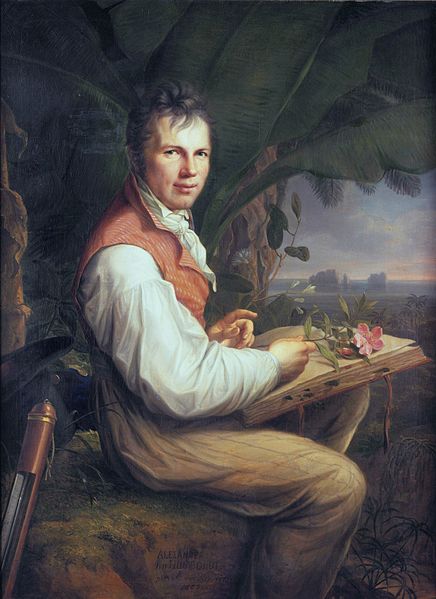Announcing the 2020-2021 Humboldt Poetry Prize Winner & Finalists
The Florida Review is pleased to announce the winner and runners-up for the second annual Humboldt Poetry Prize. The Prize, which is funded by an anonymous donor in honor of Prussian naturalist Alexander von Humboldt (1769-1859), recognizes the best poems with an environmental focus published in the previous year in The Florida Review and Aquifer: The Florida Review Online. The winner receives an award of $500, and each runner-up $250.

This year’s winner and finalists are:
- Lizzie Hutton for “Holiday 2,” winner (TFR 44.2, Fall 2020)
- Margot Douaihy for “The Murder Hornet,” runner-up (Aquifer 7 December 2020)
- Kimberly Quiogue Andrews for “Animal Spirits,” runner-up (Aquifer 23 November 2020)
The winning poem will be reprinted in Aquifer in April of this year; the runners-up will be reprinted in The Florida Review’s Spring 2022 Issue.
This year’s judge was David Keplinger, author of six collections of poetry; winner of Rilke, T. S. Eliot, Cavafy prizes; the Colorado Book and Emily Dickinson awards; recipient of two NEA fellowships; and Professor of English at American University. He had this to say about the winners and runners-up:
Lizzie Hutton’s “Holiday 2” tells a story both inviting and threatening, of a Christmas on the Gulf of Mexico, somewhere in the “cushioned here and now, these privileged / boundaries.” While this world along the shoreline was lavished with gifts and light and merriment, somewhere else a violence was playing out—which moves the speaker to question, with Darwin, the use of poetry. In the end the thing itself, the poem we have of it, affirms something remarkably poignant about knowing things could be otherwise; how the sun and the holiday, for this knowing, assume a more tenuous fragility in the heart.
In Margot Douaihy’s “The Murder Hornet,” the “efficient killer,” the murder hornet, is compared to the enormity of the speaker’s heart. “Size has its advantages,” the poet writes, but the metaphor deepens, and the poem beautifully complicates, as the pull of addiction is soon revealed to be devouring the speaker, rather than any prey. What is stunning here is the moment “the robin / thought I was a chair or tree,” when, in such a state of peace, the heart of devouring disappears, or it expands and expanding becomes a part of everything.
I admire so much the voice of Kimberly Quiogue Andrews’ “Animal Spirits,” which puts me in mind of certain lines of George Oppen I love—I think of “Route”— and the way, reflecting on the old idea that the brain is the seat of the soul, the poet writes, “The brain a bull. The world a bull with its hooves on the world. // O beast that could be gentle. Asleep in the beige autumn of the shaken head.…” What arises in this poem is simultaneously a sparkling intelligence and a sense of history and responsibility, an awareness of the “grinding sludge of machinery” that follows optimism and enterprise in capitalist societies.
Congratulations to the winner and finalists! More info about the prize and its namesake are below.
The Humboldt Poetry Prize
Each year, one winner and two runners-up will be chosen from work published in The Florida Review and Aquifer: The Florida Review Online during the previous calendar year. Candidates will be identified from all categories of works published—those that stem from general and contest submissions, as well as from solicited work that we have published.
Criteria set for the prize include:
- Probing the capabilities and needs of wild animals and challenging their exploitation;
- Exploring wild animal/human relationships;
- Experimenting with and imagining the subjective life of wild animals;
- Interrogating the poetic use of animals simply as metaphors;
- Investigating natural processes, biospheres, and their complexity; and/or
- Pondering awe in the face of nature and/or how to inspire such awe.
Each winner will receive an award of $500; each runner-up an award of $250. In addition, with each poet’s permission (or that of any subsequent book publisher), the poem will be reprinted. Works originally published in Aquifer will be reprinted in the print Florida Review, and vice versa.
Alexander von Humboldt
The new prize commemorates the legacy of the visionary German naturalist and explorer Alexander von Humboldt (1769-1859). Humboldt’s fascination with natural processes started in childhood, when he earned the nickname “the little apothecary” and continued throughout a fifty-year career as a famous public figure, in which he investigated the fields of botany, minerology, geology, isothermal mapping, meteorology, and geodetic and geomagnetic measurement. During the Napoleonic Wars, he set off to explore Central and South America and, with a French botanist, covered 6,000 miles by foot, horseback, and canoe, studying astronomy, topography, flora and fauna, and the Earth’s geomagnetic field and barometric pressure, as well as mapping 1,700 miles of the Orinoco River. They measured the river phenomenon now known as the Humboldt (or Peru) Current.
Humboldt also succeeded in marrying science and aesthetics, promoting the belief that every element of nature is dynamic and interconnected, and that these forces should be apprehended with both head and heart. In thirty volumes published during his lifetime—and filled with detailed illustrations and lyrical descriptions—Humboldt taught that nature, properly understood, stimulates the imagination as well as the intellect and is a source of beauty and consolation. His close friend Goethe noted that “with an aesthetic breeze” Humboldt lit science in a “bright flame.”
As the first scientist to identify climate zones and view the Earth’s ecology as interconnected and ever-changing, Humboldt anticipated the deleterious impact on wildlife and the biosphere, and he frequently decried the careless environmental destruction of Europe in the colonies. Even as his fame and wealth diminished later in life, Humboldt assisted many young scientists in embarking on their careers. References to his ideas appear hundreds of times in Charles Darwin’s writings, and he profoundly influenced John Muir and generations of conservationists and nature writers.
We at The Florida Review hope to continue to encourage those writers concerned with the human relationship with our planet and with the beauty and power inherent in the Earth in the tradition of the writing of Alexander von Humboldt.

